Notes on some of the carpet/kilim lines we carry:
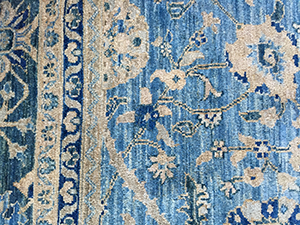
Aryana
Woven by Turkmen weavers from northern Afghanistan. The weavers employ an asymmetrical or Persian knot (90 knots per square inch) and use long staple wool from the spring shearing in central Afghanistan. This wool is hand carded, hand-spun and then dyed with roots and other plant parts collected from Afghanistan and Pakistan. The wool is hand spun by Mogul refugees in western Pakistan and then dyed in Lahore.
Weaving takes place inside village homes where several generations of women in a family work together at the loom. Very large carpets are usually woven by groups of young men on looms too large to fit in the typical family home. The carpet designs borrow from the range of oriental textile weaving traditions. Some rugs are finished with a low pile to look like older antique rugs.
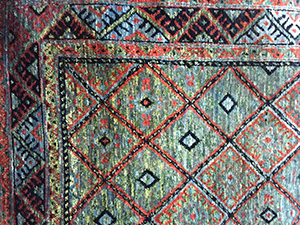
Bamiyan
Bamiyan rugs, woven by the same group, have approximately 170 knots per square inch and reproduce Persian designs.
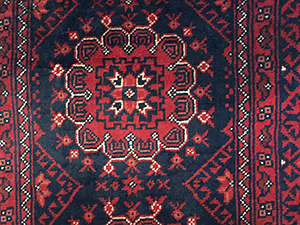
Beluch
Beluch refers to a group of people living in Beluchistan, a large area of western Afghanistan which extends into Iran and southern Pakistan. These people as well as other non-Beluch weavers make rugs referred to as Beluch.
Afghani Beluch rugs are made entirely of wool, while Irani Beluch usually have a cotton warp. Weaving is traditionally done by women on horizontal looms with asymmetric knots. Synthetic dyes are often used, and somber reds, blues and browns predominate.
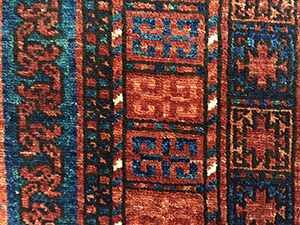
Ersari
These beautiful rugs, made from hand-spun, naturally-dyed wool, reflect traditional Ersari Turkmen designs. They often have dark wool warps, saturated vibrant colors and a braided fringe.
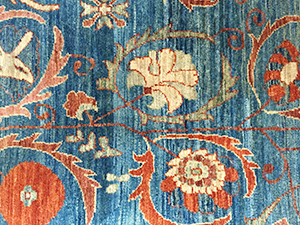
Faryab
The Faryab rug line is produced by the same Ersari Turkmen weavers, yet more finely woven with 150 knots per square inch. Designs include tribal and village decorative motifs.
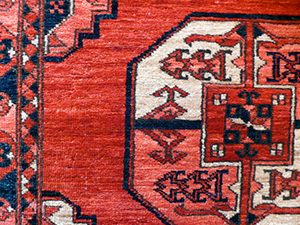
Hazara
The Hazara people weave fine supple carpets using symmetrical or Turkish knots, usually around 120 knots per square inch. These weavers also use hand carded, hand-spun and natural dyed wool.
The Hazara are a Shia people, who traditionally lived in the central mountains of Afghanistan, fled from the Taliban to Pakistan, and now have resettled in large numbers back in Afghanistan near Kabul and the center of the country.
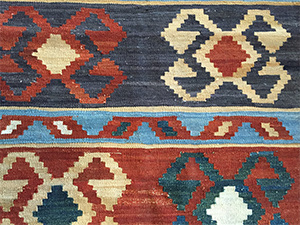
Mogoli Kilim
These flat-weave rugs are woven by the Mogol people, who are from Baghlan province in northern Afghanistan. The Mogols are descendants of the Mongols who invaded the region in the 13th century.
Mogoli kilims are woven with hand carded, hand-spun Afghani wool and dyed with native plants. Typically, they have a rough texture with uneven coloration (abrash) due to variations in the vegetable dye and feature indigenous and tribal Persian designs. Sizes are small, typically 3′ x 3′ to 5’ x 8’ and long runners.
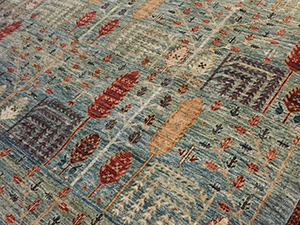
Nooristans
Nooristans are among the finest carpets we carry. The knotting is approximately 15/15 or 275 knots per square inch. Designs borrow from Persian traditions.
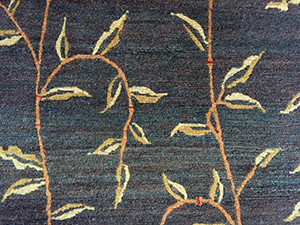
Tibetan/Zamling
Our Tibetan rugs are woven in Nepal by Tibetans as part of the Machik-Tibet Weaving Project. Tibetan rugs use hand carded and hand-spun wool that is dyed with plants native to Nepal, with the exception of indigo (blue) which comes from India. The wool comes from high plateaus in central Tibet and is extremely durable.
Tibetan rugs come in four qualities with 60, 100, 120 and 120 (wool/silk) knots to the square inch. The designs include traditional Tibetan and Chinese motifs as well as contemporary designs. The Gaon Naksha rugs have a freeform design reflecting the life experience of the weavers and usually include rural village scenes.
Profits from the production of these rugs has funded schools in Nepal, India and Tibet as well as reforestation projects in Tibet.
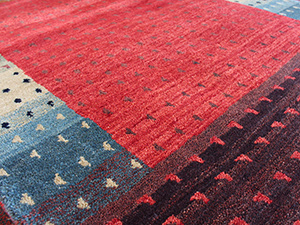
Zamin
Zamins are woven by villagers in eastern Uttar Pradesh in India. The best long staple New Zealand wool and natural dyes are used to produce colorful rugs with a heavy, thick pile (9/45 have 100 knots per square inch and 12/60 have 180 knots per square inch).
Zamins feature both modern and traditional designs. The word “zamin” means “earth” or “land” in both Persian and Hindi.
207-563-6611
info@saltbaytrading.com
584 US Route 1, Newcastle, ME 04553